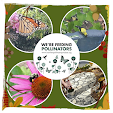This Blog is no longer receiving active posts due to a family loss which lead to the forced sale of the Pollinator Potager's location.
I am pleased to relate that the garden is still being tended by the new property owner, for which I am grateful.
The memories of my Pollinator Potager Project will remain here, and in my heart.
 |
| Click on Image to Enlarge |
I'd been looking for a pair of suitable
gardening boots for more than six months, without success: Either the
boots were too expensive, too heavy, too sloppy, or too unworthy of the
natural beauty of a garden setting.
Gardening boots, even at most
bargain stores ranged in price from $35 to $85, more than I was
prepared to spend for footwear that failed in one or more of the other
three categories.
I've found that a lot of gardening boots are
very heavy, truly cumbersome in their weight, even in the store; and,
try as I might, I couldn’t help imagining how much heavier the boots
would be when weighed down by the gooey mud of spring.
Finding
boots for myself that aren’t too sloppy has always been a problem. I
have very narrow feet, in that I’m the product of a dad who wore size 13
A-width shoes with a triple-A heel. I also blister easily, so sloppy
footwear of any kind is something I try to avoid.
To my mind,
boots that are unsuitable to a garden setting would be: plaid or argyle
patterned; branded with advertising; anything camouflage; decorated with
zippers, chains or studs; and geometric, paint splatter or leopard
printed. I’m also not really into cutesy animal themed boots; although, I
could envision them on children.
Sensing my frustration, my
sister suggested that I expand my search and check out Value Village;
and, though I hate the idea of wearing footwear previously worn by
strangers, I knuckled under and gave it a go.
Imagine my
surprise, when the first time I looked in the shoe department at my
local VV boutique, I found the perfect pair of rubber gardening boots.
They were, in fact, the only rubber boots in the entire store, and they
filled all four of my boot buying criteria.
These perfect boots
were totally affordable at $7.99, very light-weight, unbelievably
narrow, and a garden-worthy basic black. I was so excited, I could
barely contain myself!
So, now with the rubber boots of my dreams
safely stored in my hall closet, I’m so ready for spring that the wait
is intolerable. Each time I take my coat out of the closet, the rain
boots almost seem to mock me with imagined taunts that gardening weather
will never arrive.
Nevertheless, I remain optimistic that spring
is truly just around the corner, and that happy productive and
sustainable gardening is only a few weeks away.
For
this reason, I'm delighted to finally have comfortable garden-worthy
rain boots at the ready. Their presence will offer me the ability to
brave the elements in the coming months, no matter how soupy the
conditions in the garden.
 |
| Click on Image to Enlarge |
In 2013, my husband and I made the life-changing decision to transform our unfortunate patchy front lawn to a flagstone patio surrounded by trees, shrubs and perennials. A great deal of work, we'd never have survived the unending weeding, over the first few years, if not for the help of a dear friend with a strong back and unwavering spirit.
2014 found us incorporating a granite water feature in our increasingly inviting front yard garden oasis. Sitting on a comfortable two-seat bench, I find the sound of the trickling water very soothing; additionally, gold finches seem to enjoy the fountain as much as the bird bath we've also provided.
Over the winter, heading into 2015, we made a commitment to enhancing our front garden by embracing a more sustainable philosophy. That meant adding more native and pollinator friendly species, and employing better watering and mulching techniques. To that end, we've relied heavily on my sister's landscape design knowledge, and information gleaned from sustainability seminars, internet searches and garden tours.
2016 found our garden being added to the list of Hamilton's pollinator patches, a rest stop along the "pollinator highway" envisioned by the city and a collective of community organizations. We also received a "We're Feeding Pollinators" sign to proudly display in our garden, through the generosity of the Monarch Awards and the Pollinator Paradise programs.
The autumn of 2016 also found my generous friend once again assisting me, this time in the construction of a flagstone border wall along the street frontage of our urban garden. The finished product turned out better than I'd expected, and may one day provide habitat for burrowing insects.
More recently, we've decided to include the
growing of fruits, vegetables and herbs within our pollinator patch, in our own version of the
French style of potager or kitchen garden - It is our belief that a pollinator
potager garden will be more inviting and useful to us, the humans who
cultivate the land: As well, the additional pollinator friendly plantings may encourage more beneficial insects to visit.
We've been on a tremendously positive gardening journey that I hope to continue. With that in mind, I've decided to launch this blog to document our progress: It's my way of blending two of my recreational passions - writing and gardening.
And so, I welcome you to The Pollinator Potager Project! I hope you'll enjoy sharing our journey.


